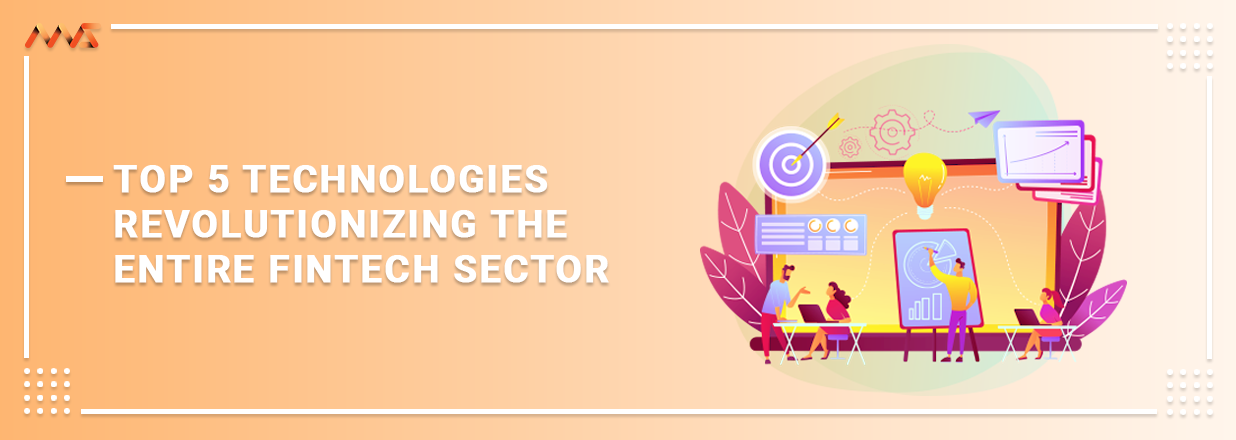The term "fintech," which stands for financial technologies, currently primarily refers to all the cutting-edge hi-tech methods for doing financial business. In this financial industry disruption, mobile fintech apps are in the limelight.
To create the greatest app user experiences that easily keep ahead of the competition, fintech app developers increasingly rely on these innovative technologies. Fintech innovations have significantly revolutionised how we manage finances and do business using mobile apps in recent years, ushering in an era unlike any other.
Let’s have a brief look at the five leading technologies for the fintech sector:
- AI
- Machine learning
- Decentralized blockchain database
- Big data
- Robotic process automation(RPA)
Fintech businesses can create cutting-edge customer solutions by using these technologies.
Artificial Intelligence
Artificial intelligence (AI) has recently become prevalent in many areas and industries. In the financial sector, AI ensures improved data and network security as well as a customised experience for customers, notably for creating fintech mobile apps.
An AI-based algorithm can quickly identify deviations or anomalies from typical patterns and behaviour based on prior user behaviour patterns and transaction histories. Further security alarms may be set off, alerting the administrators to the situation.
Machine Learning
Machine learning (ML), another branch of AI that focuses on learning from user behaviour and inputs, produces data-driven insights that give fintech app users a more tailored user experience. Machine learning (ML) methods can find anomalies and unusual user behaviour.
These observations enable the immediate strengthening of security measures for fraud prevention.
Blockchain Decentralized Database
The original Cryptocurrency, Bitcoin, is powered by the decentralized database technology known as the blockchain. Since it first appeared as a ground-breaking technology for data protection, it has continued to advance as the fundamental technology enabling numerous cryptocurrencies. The financial apps quickly adopted it to improve data security and simplify data access based on user responsibilities.
The two primary components of blockchain are smart contracts and cryptocurrency. Let's explain how these two technologies are revolutionising the banking sector.
Smart Contract
The Smart Contract serves as a protocol to enable many parties to continue having a contractually binding relationship to guarantee efficient transactions according to their needs.
The major benefit of smart contract technology is that it eliminates the need for intermediaries or third parties in peer-to-peer transactions. Custom software tools can be used to fast determine and carry out the provisions of the underlying agreement.
The automation of financial transactions based on mutual consent is made possible by smart contract technology, which has shown to be very successful in the financial industries of insurance, loans, and credit products, among others. By eliminating the requirement for a third-party mediator to facilitate transactions, smart contracts significantly reduce transaction and operational costs while streamlining the procedures to provide better customer service.
Cryptocurrencies
The first cryptocurrency to be used in the financial world was Bitcoin, which was made feasible by the decentralised database technology known as Blockchain.
- Transparency - Transaction histories are now more transparent than ever thanks to blockchain technology. Each node in the network has a copy of the documentation because it is a particular form of distributed ledger.
- Security - By all measures, the blockchain outperforms all other record-keeping systems in terms of security. Only a blockchain network's consensus can update and/or modify the shared records of transactions.
Big Data
Big Data is an important technology for the financial industry since it represents the enormous volume, high velocity, and veracity of rising digital data. Every second, bank and other financial institutions produce massive amounts of digital data, presenting analytics with previously unheard-of prospects. It makes sense that the largest financial institutions in the world rely on Big Data analytics to produce data-driven market insights.
- Financial solutions may target clients using a variety of segmentations supported by data-driven insights.
- Big Data also enables the personalization of each user's experience with fintech apps through data-driven insights.
- A financial organization can keep up with new and developing industry trends using big data.
- A financial organization can estimate interest rates and market receptivity more precisely using Big Data analytics.
Automating Process Robotically (RPA)
Today, simplifying workflows for improved performance is a widely used business technique. Automating backend processes and transactions in financial institutions and organizations is more important since it enables numerous transactions without compromising user experience.
Takeaway
These technologies mentioned above will help determine the future direction of fintech apps. Fintech will become more intelligent, automated, precise, and secure in the upcoming years. we at Martvalley Services offerings for Blockchain, Cryptocurrency, Big Data, and RPA solutions in various sectors. Our managed blockchain services empower businesses to conduct tamper-proof transactions and improve customer engagement.
We help you streamline processes and boost profits. Learn what consultants do and how to choose the right one -: https://mvs.martvalley.com/”


